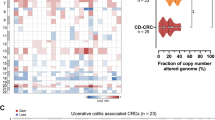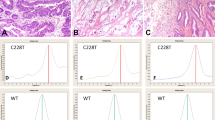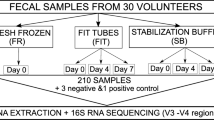Abstract
Telomerase is a ribonucleoprotein capable of replacing telomeric DNA sequences that are lost at each cell division. Under normal circumstances, it is active in rapidly dividing embryonic cells and in stem cell populations but not in terminally differentiated somatic cells. Much attention has recently focused on the hypothesis that activity of this enzyme is necessary for cells to become immortal. This predicts that telomerase activity should be detectable in malignant cells and tissues but not in their normal counterparts, which slowly senesce and die. In accordance with this notion, telomerase activity has been reported in a wide range of malignancies, including those of the gastrointestinal tract, breast and lung. In the present study, we used a polymerase chain reaction (PCR)-based assay for telomerase activity, designated the "telomeric repeat amplification protocol (TRAP)', to examine initially 35 colonic carcinomas, their corresponding normal tissues and 12 inflammatory bowel disease (IBD) lesions. We detected strong enzyme activity in 32 (92%) of the 35 colon carcinomas while there was no activity in 30 (86%) of 35 matched normal colonic tissue specimens and only very weak activity in the remainder. Four of seven specimens of ulcerative colitis and two of five Crohn's disease lesions were negative, and the rest were only weakly positive. These results led us to examine whether telomerase could be detected in carcinoma cells exfoliated into the colonic lumen. We assayed lysates of exfoliated cells in luminal washings from colectomy specimens of 15 patients with colon carcinoma and nine with IBD. Telomerase activity was detected in washings from 9 (60%) of the 15 colon carcinoma cases but not in any from cases with IBD, suggesting that it can be a good marker for the detection of colon carcinoma, possibly even in non-invasively obtained samples.
This is a preview of subscription content, access via your institution
Access options
Subscribe to this journal
Receive 24 print issues and online access
$259.00 per year
only $10.79 per issue
Buy this article
- Purchase on Springer Link
- Instant access to full article PDF
Prices may be subject to local taxes which are calculated during checkout
Similar content being viewed by others
Author information
Authors and Affiliations
Rights and permissions
About this article
Cite this article
Yoshida, K., Sugino, T., Goodison, S. et al. Detection of telomerase activity in exfoliated cancer cells in colonic luminal washings and its related clinical implications. Br J Cancer 75, 548–553 (1997). https://doi.org/10.1038/bjc.1997.96
Issue Date:
DOI: https://doi.org/10.1038/bjc.1997.96
This article is cited by
-
Mechanisms of human telomerase reverse transcriptase (hTERT) regulation: clinical impacts in cancer
Journal of Biomedical Science (2018)
-
Is telomerase a novel target for metastatic colon cancer?
Current Colorectal Cancer Reports (2009)
-
Telomerase detection in the diagnosis and prognosis of cancer
Cytotechnology (2004)
-
Clinical utility of telomerase in cancer
Oncogene (2002)
-
Emerging molecular markers of cancer
Nature Reviews Cancer (2002)



